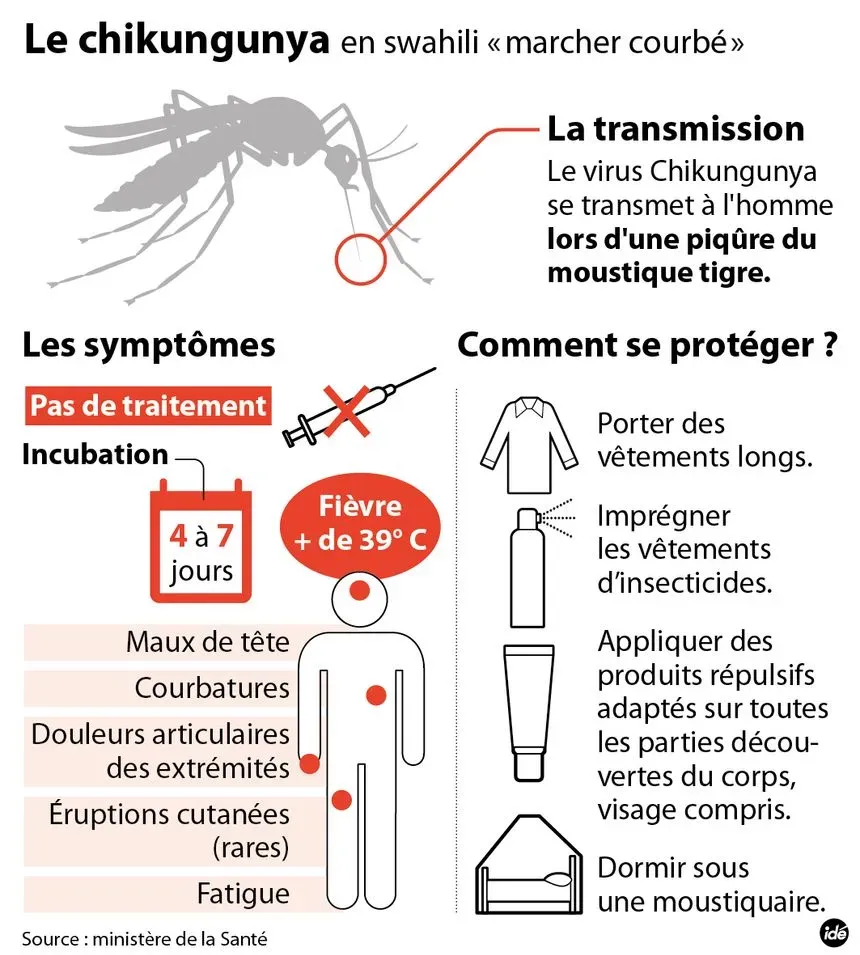Chikungunya in France has become a growing concern for residents and travelers alike as health officials warn of an increased risk from this debilitating mosquito-borne disease. Traditionally endemic to tropical regions, the Chikungunya virus has recently emerged in local communities, with reports of several cases surfacing earlier in the year. The alarming rise in infections may be attributed to climate change, which has facilitated the spread of invasive mosquitoes capable of transmitting not only Chikungunya but also other illnesses like dengue fever in France. This highlights the importance of addressing travel health risks associated with these emerging pathogens and emphasizes the necessity for public awareness and preventive measures. As officials urge the public to take precautions against mosquito bites, understanding the implications of these infections is crucial in safeguarding both local and visiting populations.
The emergence of the Chikungunya virus in metropolitan areas signals a troubling trend in public health as European nations are grappling with the effects of climate change on disease vectors. As instances of this severe mosquito-borne illness increase, experts are categorizing the situation alongside other viral threats such as dengue fever and West Nile virus. Invasive mosquito species have adapted to new environments, rising concerns about the transmission of potentially life-threatening conditions. Travelers to France must remain vigilant and educate themselves about these health risks while navigating this evolving landscape. Enhanced awareness about the presence of these dangerous pathogens is essential to ensure safety and well-being during vacations and business trips.
Understanding Chikungunya in France
Chikungunya virus is a mosquito-borne disease that can lead to severe joint pain, fever, and fatigue, and it has recently been reported in France. While traditionally associated with tropical regions, an alarming rise in local cases has made Chikungunya a concern for holidaymakers visiting Europe. Health officials in France have identified several local cases, raising awareness about the virus primarily spread by the Aedes mosquitoes, which have been increasingly documented in Europe due to changing climatic conditions.
As Chikungunya’s presence escalates in regions like France, understanding its symptoms and transmission is critical for travelers. With similar symptoms to dengue fever, it often goes unnoticed at first, making early detection crucial for treatment and prevention. This situation underscores the importance of being informed about mosquito-borne diseases and taking proactive measures, especially in areas where invasive mosquitoes are prevalent.
The Growing Threat of Mosquito-Borne Diseases
Mosquito-borne diseases, including Chikungunya and dengue fever, pose significant travel health risks in various regions, particularly in France. An increase in invasive mosquito species has led to a rise in these diseases, making it imperative for travelers to be cautious. The dual threat of Chikungunya and dengue fever can lead to substantial health impacts, including severe pain and serious medical complications. Travelers are urged to stay informed about local health advisories, especially during peak mosquito activity seasons.
In recent years, the number of reported dengue fever cases in France has significantly surged, reflecting a broader trend observed across Europe. Public health officials have documented a dramatic increase, citing health measures that must be adopted by visitors to mitigate risks. Effective prevention strategies include wearing protective clothing, using insect repellent, and maintaining a barrier between themselves and potential mosquito bites, especially during peak hours when these pests are most active.
Prevention Strategies Against Mosquito Bites
To protect oneself from mosquito-borne diseases, including Chikungunya and dengue fever in France, travelers must adopt effective prevention strategies. Using mosquito repellents containing DEET, wearing long sleeves, and choosing to stay in screened or air-conditioned accommodations can significantly reduce exposure risk. Public health recommendations emphasize being vigilant, especially during early morning and late evening hours when mosquitoes are most prevalent.
Travelers should also be aware of local conditions that may predispose them to mosquito bites, such as standing water where these insects breed. It is essential to empty containers that collect water in and around accommodations to prevent mosquito breeding. The effort must be collective, as public awareness about the increased activity of invasive mosquito species can foster community action against these pests and reduce the risk of outbreaks.
Impact of Climate Change on Mosquito Populations
Climate change is increasingly influencing the patterns of mosquito populations, leading to a rise in the incidence of diseases such as Chikungunya in regions like France. Warmer temperatures and fluctuating weather patterns create favorable conditions for mosquitoes to thrive and expand their habitats beyond traditional borders. This has been particularly evident with the Aedes aegypti mosquito, which is responsible for the spread of Chikungunya and dengue fever.
Health experts stress the urgency of understanding climate impacts on mosquito distribution to develop effective strategies for controlling outbreaks. As the climate continues to change, the migration of mosquito populations northward poses an ongoing risk for Europe, necessitating continual monitoring and public health preparedness. With increased awareness and proactive measures, the risk of mosquito-borne diseases can be managed more effectively.
Travel Health Risks for Holidaymakers
For holidaymakers traveling to France, the risk of contracting mosquito-borne diseases such as Chikungunya and dengue fever is of increasing concern. The presence of local cases indicates that travelers must remain vigilant about their health and the local environment. Reports from health authorities highlight the importance of understanding the symptoms and impacts of these diseases on travelers’ health, emphasizing preventive measures.
In addition to taking standard precautions such as using repellents and avoiding peak mosquito hours, travelers should familiarize themselves with the local healthcare system. In the event of symptoms following a mosquito bite, rapid access to medical advice and treatment can significantly affect outcomes. Preparation and awareness of the travel health risks associated with mosquito-borne illnesses can ensure safer travel experiences.
Recognizing Symptoms of Chikungunya and Dengue Fever
Recognizing the symptoms of Chikungunya and dengue fever is crucial for timely medical intervention. Chikungunya manifests as high fever, severe joint pain, and other flu-like symptoms, while dengue fever presents with intense headaches, muscle pain, and nausea. Both diseases can lead to serious complications if left untreated; hence, travelers to France should be aware of these signs.
Understanding these symptoms can empower travelers to seek immediate medical attention should they experience any concerning signs after potential exposure to mosquitoes. This awareness helps not only the individual but also the community by reducing the spread of these transmissible diseases, contributing to public health efforts to control mosquito-borne illnesses.
Regional Efforts to Control Invasive Mosquitoes
Regional public health authorities in France are taking proactive steps to control invasive mosquito populations that facilitate the spread of diseases such as Chikungunya and dengue fever. Implementing strategies like monitoring mosquito breeding sites and providing public education on environmental management are critical components of these efforts. Authorities are encouraging communities to collaborate in efforts to eliminate stagnant water sources, which serve as breeding grounds for mosquitoes.
The collective actions focused on invasive mosquitoes not only help reduce the prevalence of mosquito-borne diseases but also support public health initiatives vital for traveler safety. Residents and visitors alike are urged to participate in efforts aimed at controlling mosquito populations, thereby fostering a safer environment against harmful bites and potential disease transmission.
The Importance of Vaccination and Public Awareness
Public awareness about the risks associated with emerging mosquito-borne diseases is paramount, particularly as vaccination campaigns can play a role in controlling outbreaks. While vaccines for diseases like Chikungunya are in various stages of development, public health officials stress the importance of informing the public about the diseases and how they can affect populations. Vaccination, when available, alongside traditional preventive measures, can significantly reduce the severity of these diseases.
Moreover, engaging in conversations about vaccination options fosters a culture of health consciousness among travelers. In the case of adverse reactions reported from the vaccine for Chikungunya, transparency and clear communication from health authorities are essential to build trust and encourage the uptake of preventive measures. Increasing public awareness can greatly enhance community resilience against mosquito-borne diseases.
The Role of International Cooperation in Disease Prevention
International cooperation is crucial in addressing the challenges posed by mosquito-borne diseases like Chikungunya and dengue fever. Countries sharing borders must collaborate on public health initiatives, exchanging information about outbreaks and preventive measures. Such partnerships can enhance surveillance and response capabilities and enable better control of invasive mosquito species.
In light of global travel and interconnectivity, concerted efforts to understand and mitigate the transmission of diseases across borders can effectively reduce the health risks associated with mosquito bites. Initiatives fostered by organizations such as the World Health Organization often advocate for collaborative research, risk assessment strategies, and shared resources to combat mosquito-borne diseases effectively.
Frequently Asked Questions
What is Chikungunya in France and how can it affect travelers?
Chikungunya in France refers to the presence of the Chikungunya virus, which is transmitted by mosquitoes. It can cause severe symptoms like excruciating body pains and, in some cases, lead to serious complications like organ damage. Travelers to France should be aware of this risk and take precautions against mosquito bites.
What precautions should travelers take to avoid Chikungunya in France?
To avoid Chikungunya in France, travelers should apply mosquito repellent on exposed skin, wear long sleeves and long trousers, especially during dusk and dawn, and sleep in air-conditioned or screened rooms. Additionally, it’s important to manage standing water in areas where mosquitoes breed.
Are there recent cases of Chikungunya virus reported in France?
Yes, health officials in France have reported local cases of the Chikungunya virus, highlighting the increasing incidence of mosquito-borne diseases due to environmental changes. Recent alerts indicate that cases have arisen earlier in the year than usual.
How does Chikungunya relate to other mosquito-borne diseases in France, like dengue fever?
Chikungunya in France is part of a broader concern regarding mosquito-borne diseases, which also include dengue fever. Cases of dengue fever have surged in France, doubling last year, indicating a rising trend of mosquito-borne illnesses due to favorable climates for invasive mosquitoes.
What actions are French health authorities taking regarding Chikungunya and related diseases?
French health authorities are issuing alerts about Chikungunya and other mosquito-borne diseases, advising the public to take protective measures against the rising threat of invasive mosquitoes. This includes public health campaigns and monitoring for outbreaks in affected areas.
Why is there an increase in Chikungunya and other tropical diseases in France?
The increase in Chikungunya and other tropical diseases in France is linked to climate change, which facilitates the spread of invasive mosquitoes that carry these viruses. Such changes are altering the distribution and activity of these vectors, leading to more local cases.
What can travelers do to stay informed about Chikungunya and dengue fever risks in France?
Travelers can stay informed about Chikungunya and dengue fever risks by checking updates from health organizations such as the ECDC, following local health advisories, and being aware of local mosquito activity reports during their visit to France.
Can Chikungunya be transmitted from person to person in France?
While Chikungunya cannot be transmitted directly from person to person, an infected individual can be bitten by a local mosquito, which may then spread the virus to others. Thus, preventing mosquito bites is crucial for controlling outbreaks.
| Key Point | Details |
|---|---|
| Chikungunya in France | Travelers may face risks of Chikungunya, a potentially fatal virus causing severe body pain. |
| Outbreak Timing | Local cases have arisen earlier than usual, indicating a potential increase in mosquito populations in France. |
| Climate Change Factors | Health officials link the rising incidence of Chikungunya to climate change, which may be making conditions favorable for mosquito breeding. |
| Precautions Urged | Authorities encourage the use of mosquito repellents, long clothing, and mosquito-proof accommodations. |
| Related Diseases | Other mosquito-borne illnesses, such as dengue, are also increasing in Europe, highlighting the need for vigilance. |
| Invasive Mosquitoes | Rise of tropical mosquitoes in Europe, with alerts issued in Belgium regarding increased local populations. |
| Chain of Infection | Infected travelers can spread diseases, leading to outbreaks in non-endemic regions. |
Summary
Chikungunya in France poses a significant health risk for holidaymakers, as recent outbreaks highlight the dangers of this debilitating virus. With early warnings from health officials about local cases and the influence of climate change on mosquito populations, it is crucial for travelers to stay informed and take appropriate precautions. As the prevalence of Chikungunya and related mosquito-borne diseases such as dengue fever rises, understanding the risks and adopting protective measures becomes essential for a safe visit to France.



